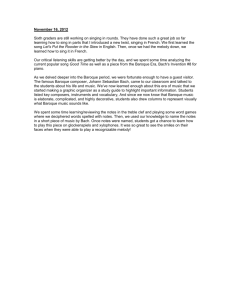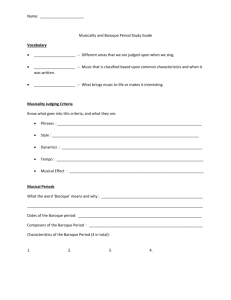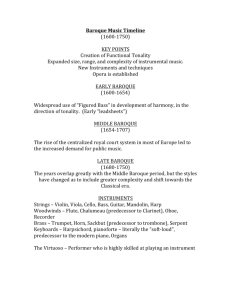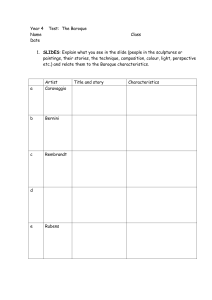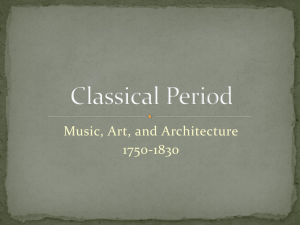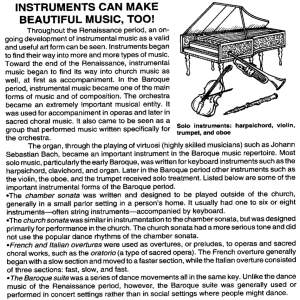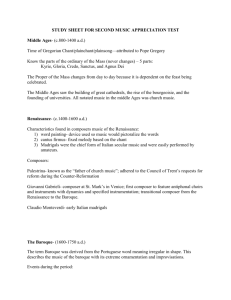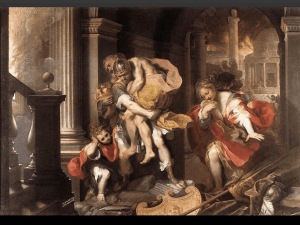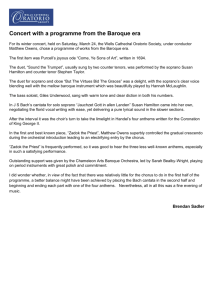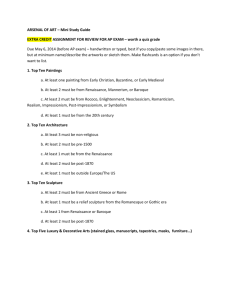Word document
advertisement
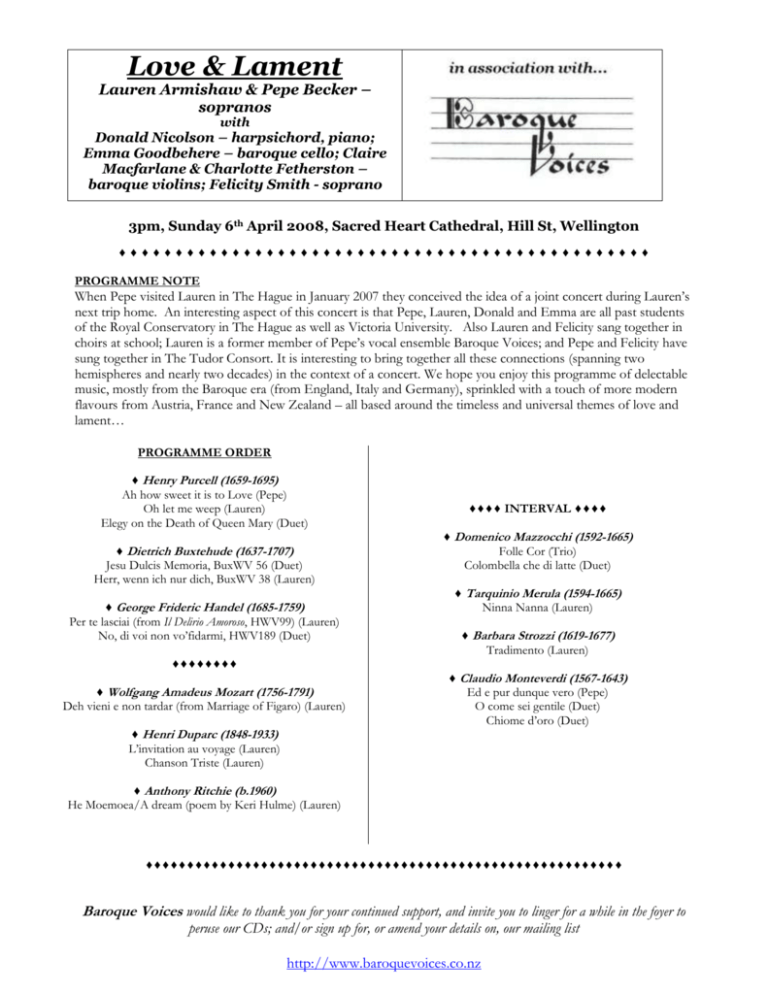
Love & Lament Lauren Armishaw & Pepe Becker – sopranos with Donald Nicolson – harpsichord, piano; Emma Goodbehere – baroque cello; Claire Macfarlane & Charlotte Fetherston – baroque violins; Felicity Smith - soprano 3pm, Sunday 6th April 2008, Sacred Heart Cathedral, Hill St, Wellington ♦♦♦♦♦♦♦♦♦♦♦♦♦♦♦♦♦♦♦♦♦♦♦♦♦♦♦♦♦♦♦♦♦♦♦♦♦♦♦♦♦♦♦♦♦♦♦ PROGRAMME NOTE When Pepe visited Lauren in The Hague in January 2007 they conceived the idea of a joint concert during Lauren’s next trip home. An interesting aspect of this concert is that Pepe, Lauren, Donald and Emma are all past students of the Royal Conservatory in The Hague as well as Victoria University. Also Lauren and Felicity sang together in choirs at school; Lauren is a former member of Pepe’s vocal ensemble Baroque Voices; and Pepe and Felicity have sung together in The Tudor Consort. It is interesting to bring together all these connections (spanning two hemispheres and nearly two decades) in the context of a concert. We hope you enjoy this programme of delectable music, mostly from the Baroque era (from England, Italy and Germany), sprinkled with a touch of more modern flavours from Austria, France and New Zealand – all based around the timeless and universal themes of love and lament… PROGRAMME ORDER ♦ Henry Purcell (1659-1695) Ah how sweet it is to Love (Pepe) Oh let me weep (Lauren) Elegy on the Death of Queen Mary (Duet) ♦ Dietrich Buxtehude (1637-1707) Jesu Dulcis Memoria, BuxWV 56 (Duet) Herr, wenn ich nur dich, BuxWV 38 (Lauren) ♦ George Frideric Handel (1685-1759) Per te lasciai (from Il Delirio Amoroso, HWV99) (Lauren) No, di voi non vo’fidarmi, HWV189 (Duet) ♦♦♦♦♦♦♦♦ ♦ Wolfgang Amadeus Mozart (1756-1791) Deh vieni e non tardar (from Marriage of Figaro) (Lauren) ♦ Henri Duparc (1848-1933) L’invitation au voyage (Lauren) Chanson Triste (Lauren) ♦♦♦♦ INTERVAL ♦♦♦♦ ♦ Domenico Mazzocchi (1592-1665) Folle Cor (Trio) Colombella che di latte (Duet) ♦ Tarquinio Merula (1594-1665) Ninna Nanna (Lauren) ♦ Barbara Strozzi (1619-1677) Tradimento (Lauren) ♦ Claudio Monteverdi (1567-1643) Ed e pur dunque vero (Pepe) O come sei gentile (Duet) Chiome d’oro (Duet) ♦ Anthony Ritchie (b.1960) He Moemoea/A dream (poem by Keri Hulme) (Lauren) ♦♦♦♦♦♦♦♦♦♦♦♦♦♦♦♦♦♦♦♦♦♦♦♦♦♦♦♦♦♦♦♦♦♦♦♦♦♦♦♦♦♦♦♦♦♦♦♦♦♦♦♦♦♦♦♦♦♦ Baroque Voices would like to thank you for your continued support, and invite you to linger for a while in the foyer to peruse our CDs; and/or sign up for, or amend your details on, our mailing list http://www.baroquevoices.co.nz TRANSLATIONS ♦ Elegy on the Death of Queen Mary O guardian god of the house of Orange, And certain hope of our tottering royal line; O God whom we summon in troublesome times, O sanctuary of virtue in good fortune! If we implore thy mercy from Isis’ banks With mournful dirges, with mournful cries an Oxonian chorus, If we invoke thee where the restless waves of his river beat on distant Cambridge, Descending from heaven, behold our misery, Have pity, behold how thine heirs languish neglected, Descending, behold how they languish, thy children, the heirs of Caesar, and cross the Stygian river. Maria, whom weeping muses mourn, Maria, brief joy of sorrowing people, Maria, gone from us, Oh mourn her, oh mourn for Maria, Mourn Maria, ye people of Cambridge, Oh mourn the Goddess! Mourn a goddess dying. ♦ BuxWV 56 Jesu Dulcis Memoria Jesus, sweet remembrance, granting the heart its true joys, but above honey and all things is His sweet presence. Nothing more pleasing can be sung, nothing gladder can be heard, nothing sweeter can be thought than Jesus, son of God. Jesus, hope of the penitent, how merciful you are to those who ask, how good to those who seek, but O, what you are to those who find! The tongue has no power to describe nor writings to express, but only belief can know by experience what it is to love Jesus. Be our joy, O Jesus, who will be the prize we win, May all our glory be in you, always and through all ages. ♦ BuxWV 38 Herr, wenn ich nur dich Lord, if only I have You I ask nothing else from Heaven or earth. If my body and soul alike languish then are You, O God, always my heart's comfort and my portion. ♦ Per te lasciai Recit: But stop, my thoughts, alas it’s true that Thrysis is condemned to darkest Hell as a just punishment for my cruel fate. Yes, I’ll rapidly descend to save my beloved from the redhot sands of Pluto, the God of burning Hell. But what do I see? A wandering spirit looks upon me angrily and then flees from me. Thyrsis, oh cruel one! Aria: For you I left the daylight, and now that love leads me to find you, you want to leave me. Oh, stop your uncertain steps, or if you want to go, at least tell me why. ♦ HWV 189 No, di voi non vo’ fidarmi No, I do not want to trust you, blind Love, cruel Beauty. You lie too much, like blandishing gods. Once before you managed to trap my trusting heart. I know from experience your lies, you will always be two tyrants. ♦ Deh vieni e non tardar Recit: Finally the moment has arrived, when I can relax in the arms of my beloved. Fearful anxieties leave my heart! Don’t disturb my delight. It seems that earth and heaven answer my heart's amorous fire as the night responds to my ruses. Aria: Oh, come, don't be late, my beautiful joy. Come where love calls you to enjoyment. Until night's torches no longer shine in the sky. As long as the air is still dark and the world quiet. Here the river murmurs the light plays restoring the heart with sweet ripples. Little flowers laugh and the grass is fresh. Here everything entices one to love's pleasures. Come my dear among these hidden plants. I want to crown you with roses. ♦ L’invitation au voyage My child, my sister, think of the sweetness of going there to live together! To love at leisure, to love and to die in a country that is the image of you! The misty suns of those changeable skies have for me the same mysterious charm as your fickle eyes shining through their tears. See how those ships, nomads by nature, are slumbering in the canals. To gratify your every desire they have come from the ends of the earth. The westering suns clothe the fields, the canals, and the town with reddish-orange and gold. The world falls asleep bathed in warmth and light. There, all is harmony and beauty, luxury, calm and delight. ♦ Chanson Triste Moonlight slumbers in your heart, a gentle summer moonlight, and to escape the cares of life I shall drown myself in your light. I shall forget past sorrows, my sweet, when you cradle my sad heart and my thoughts in the loving calm of your arms. You will rest my poor head sometimes on your lap, and recite a ballad that will seem to speak of us; and from your eyes full of sorrow, from your eyes I shall then drink so many kisses and so much love that perhaps I shall be healed. ♦ Folle Cor Since false pleasures only spread among little errant solemnities. Please flee, for, no sooner born, Serene life is wont to disappear. The day shines; However, at dawn, It loses the beauty of its flowers, And the air languishes in the sunlight, And Flora (plants) fades: Please flee, for, no sooner born, Serene life is wont to disappear. The sea jests; but its sapphire colours Are nests of tempest: Although eternal the motion, The stars in heaven must fade as well. Please flee, for, no sooner born, Serene life is wont to disappear. 2 ♦ Colombella A gentle dove whose milk-white wings Scatter shining waves of light Is Mary, in whose heart Is the purity of virgin snow. But when combating wickedness She, among the hideous Dragons, Is an Eagle armed with darts. Should the hellish Hydra hiss, She would crush it beneath her foot. O rare examples afforded by the world! She is a Dove in peace, an Eagle in battle. If a snow-white Lamb Appears in all its purity, There I see reflected Jesus’s spirit and his love. But if from his deep breast A Lion, terror of the woods, Sends forth his roar, I recognize Jesus fulminating In wrath against the wicked. May this serve as a paragon: A lamb is he to the Righteous, to the wicked, a Lion. ♦ Ninna Nanna Now it’s time for slumber, sleep my son and don’t cry, for the time will come for weeping. Oh my love, my sweet, sing this lullaby Close those heavenly eyes as other children do, for soon the skies’ light will be veiled in darkness, Oh my love, my sweet,sing this lullaby Take this milk from my immaculate breast for the cruel minister prepares for you vinegar and gall Oh my love, my sweet, sing this lullaby My love, let this breast be a soft bed for you now, before commending your soul to Father on the cross Oh my love, my sweet, sing this lullaby Rest now these fine limbs so charming and delicate, for then irons and chains will inflict great pain on them Oh my love, my sweet, sing this lullaby These hands and feet which you see with pleasure and joy, alas, in so many ways they will be pierced by sharp objects. This pretty face, brighter than a rose, will be tainted by spit and tortured with great suffering, Oh what pain, you, my only hope, this head will be pierced by sharp thorns. Oh, when I think that in this divine breast mortal wounds will be caused by villanous spears treachery. Sleep then my son, my saviour, for then with joy we shall meet again in Paradise. Now sleep, love of my life, joy of my heart. Let all be hushed by pure devotion, the earth and heaven shall fall silent. And meantime, what shall I do? I shall watch over my love, I’ll remain with bowed head so long as my child sleeps. ♦ Tradimento Betrayal! Love and Hope want to make me a prisoner and my sickness is so advanced that I have discovered I’ve convinced myself I am happy about it! Betrayal! Hope, to bind me tricks me with great things. The more I believe her, the tighter she ties the laces that enchain me. My heart, take arms! If you meet the unfaithful ones take them, kill them, hurry! Every moment is dangerous. Betrayal! ♦ Ed è pur dunque vero And it is still therefore true, oh inhuman heart, cruel soul, That by changing your thought you are left totally without loyalty and love. Boast then of having betrayed me! Because now my lyre is turned to weeping. This is the reward for my so many amorous tribulations; So your evil destiny gives me repayment. Evil stars! But if your heart is resistant to all faithfulness, Lydia, It is your own fault, not the stars’. I shall drink, unhappy one, my assassinated troubled tears, And always be mourned by all other abandoned lovers. And I shall engrave on marble by my faith: “Foolish is that heart which believes in a beautiful woman.” Lacking in comfort and hope, I shall go wandering homeless, And without a body or haven I shall live amidst tempests, sad and lonely. Neither shall I avoid death from precipices, Since a person who isn’t even alive cannot die. The number of years in which I was melting snow to the sun of your beauties; The height of suffering that never gave me even brief respite – These things will teach the winds to murmur your perfidies, Oh cruel one, and my torments Live, live, you heart of ice, and let the breeze beware your inconstancy; Clasp your beloved in your arms; and with him triumph over and laugh at my sufferings. And together in sweet, welcome union Build the tomb for my life. Abysses, listen to the last words of my desperation, Since my joys and the loves and my happiness are finished. So great is my unhappiness, which I want to name, And my torment is like the torment of hell. ♦ O come sei gentile – duet Oh how gentle you are, dear little bird; oh how much is my state, in love, like yours: I am a prisoner, you are a prisoner; you sing, and I sing; you sing for her who has captured you, and I sing for her also. But in this, my grievous destiny is different to yours: what’s the use in being melodious? You live singing; and singing, I die. ♦ Chiome d’oro Hair of gold, beautiful treasure, You tie me in a thousand knots If only you would tie, if only you would untie. Whitest chosen pearls, If the pink (lips) that cover them Are uncovered, I am wounded! Living stars that are so beautiful And sparkling so vibrantly, If you laugh, it kills me. Precious, loving, beloved lips of coral, If you speak, I am blessed. Oh beautiful knots in whom I rejoice, In gentle departing from life, Oh welcome my wound! Acknowledgements: the performers wish to thank the Armishaw family, and Beth Wood, for assistance with publicity, programme production & photography; Douglas Mews, for the use of his harpsichord; Radio NZ Concert, for hosting Lauren & Pepe on Upbeat! earlier this week; and Anthony Donovan, for recording this performance. Soprano Pepe Becker began her musical training in Nelson: as a chorister in the Nelson Cathedral Choir; as a pianist and singer in various school groups; and as an oboist in local orchestras. Moving to Wellington in 1985, she developed a keen interest in early music through singing in chamber choirs such as Cantoris and The Tudor Consort, and soon began performing professionally as a solo soprano in this field. After completing her BMus (in Composition) at Wellington’s Victoria University in 1987, she travelled to Europe in 1991 to further her studies of Baroque Singing. She trained privately for a year in London with Jessica Cash, then moved to The Netherlands, where she studied for a further year with Marius van Altena at The Hague’s Royal Conservatory and performed professionally with a number of early music groups. Since her return to New 3 Zealand in 1993, Pepe has set up her own vocal consort, Baroque Voices; had three children; lectured in Musicianship for several years at Massey University and the New Zealand School of Music; and become re-established as a versatile and highly soughtafter musician in her home country. In 1999 she became a member of the national chamber choir Tower Voices New Zealand, and since then has been involved in most of their performances, both in New Zealand and overseas. She continues to perform regularly as a soloist with chamber groups, choirs and orchestras throughout New Zealand; directs, manages and sings in Baroque Voices; composes music; and teaches piano and singing. Pepe’s next concert appearance in Wellington will be with Baroque Voices, singing and directing the group in their “Alleluia: a newë work!” concert on 10th May, which will feature Medieval music alongside several new works by NZ composers (including one of her own), commissioned with funding from Creative NZ. It has been a joy for her to work with Lauren again after several years - Lauren was a member of Baroque Voices before she left NZ to study singing in The Hague in 2001 – and she hopes to do so again before too long. Soprano Lauren Armishaw grew up in Eastbourne and attended Chilton St James School. Her early musical training was obtained through Gallery Music Centre and Chilton where she learnt piano, violin and choral singing. She regularly performed in the HV Performing Arts Society’s Competitions. She has been a member of the New Zealand Secondary Students Choir, the New Zealand Youth Choir and World Youth Choir. Lauren attended Victoria University where she completed a BSc (Mathematics), BMus (Composition) followed by a Post Graduate Diploma (Italian plus Performance Voice under Emily Mair). In 2002 Lauren spent six months in Rome improving her Italian skills and also participated in the first of Patricia Hurley’s ‘Italian for Opera Singers’ School. Late 2002 she commenced studies at The Royal Conservatory in The Hague and in 2007 gained, with distinction, a Master's in Early Music, specializing in Italian 17th Century Music. She has a particular interest in early opera. Recent roles include Laodice in Handel’s Siroe and Venere in Cavalli's ‘Ercole Amante’. In 2007 Lauren played Teopiste in Lanciani's sacred opera ‘Il Martirio di S. Eustachio’, a production she mounted with support from Creative NZ. Lauren also performs professionally as a soloist and ensemble member of groups such as The Netherlands Bach Choir and Arpeggiata. She is quickly gaining a reputation for singing Handel Arias, last year touring the Czech Republic with Baroque Orchestra Nova Silesia. Later this year she will tour Belgium with Baroque Orchestra Les Muffatti. She also performs regularly with her own trio Lacrime Amorose (soprano/baroque harp/theorbo). Harpsichordist Donald Nicolson completed his studies at Victoria University, Wellington in 2002 with a BMus with First Class Honours in performance. From 2000, he developed a successful and varied professional career, performing with the New Zealand Symphony Orchestra, the New Zealand Chamber Orchestra and contemporary ensemble Stroma. In 2003, he commenced studying with Ton Koopman and Tini Mathot at the Royal Conservatory in The Hague, Netherlands, focusing especially on the interpretation of the 16th Century English School, but more recently, the music of 17th century France. In Europe, Donald was a member of many ensembles, including In Vento, New Dutch Academy, Musica Poetica Lübeck and The Tasman Players. Varied concert programmes took him through Holland, Belgium, France, Germany and Poland. Since returning to New Zealand in late 2007, Donald has performed throughout Australasia in his beloved NZSO, Stroma, Musica Sacra and Melbourne-based Fifth Continent. Future concerts in Australia are already planned. In February 2008, Donald was appointed organist at St Mary's of the Angels. In July he will be part of the Messiaen tribute at that church, presenting many of the composer's works for organ. During the 2008 NZ Festival of the Arts Donald had significant involvement: he was director of Baroque concerts at the NZ Portrait Gallery (with his Tasman Players); and appeared with New York's Absolute Ensemble, and in Stroma's Charlie Chaplin concert. Cellist Emma Goodbehere attended Hutt Valley High School where she performed in chamber groups which had some success in the New Zealand Community Trust Chamber Music Contest. She then attended Victoria University graduating in 2004 with a Bachelor of Music with First Class Honours. She studied Baroque/Classical Cello as a second instrument to Modern cello. In 2005, she went on to do Post-Graduate studies specialising in Baroque/Classical Cello at The Royal Conservatory in The Hague under Jaap ter Linden. Overseas she had many opportunities to learn from famous Baroque/Classical cellists and attend summer schools. She was also a founding member of a Baroque ensemble in The Hague, consisting of New Zealanders, called The Tasman Players. At the moment, Emma teaches Suzuki cello and works for Chamber Music New Zealand. Mezzo-soprano Felicity Smith holds a Graduate Diploma in Music (Vocal Performance) from the New Zealand School of Music, where she studied under Flora Edwards. She also has a Bachelor of Music in Composition and a Bachelor of Arts with Honours in French from Victoria University, and is currently completing a Master of Music in Musicology at the NZSM. As a vocal soloist, Felicity has appeared with several Wellington choirs including the Orpheus Choir of Wellington and The Tudor Consort, and more recently with the Ensemble Musicanti and The Sorbonne Scholars in Paris. Last year Felicity was a member of the internationally-auditioned Festivalensemble Stuttgart, and studied singing with Thomas Heyer (Cologne) and Robert Expert (Paris). Felicity has also sung for numerous recordings and broadcasts of New Zealand music, often as a soloist. In 2007 she recorded David Farquhar’s ‘Swan Songs’ for future release by Wai-te-ata Music Press. Violinist Claire Macfarlane completed her BMusHons in Performance Violin at Massey (Wellington) in 2001. Over subsequent years she developed a keen interest in and enthusiasm for Baroque performance and period instruments. This led to a year of study at the Royal Academy of Music, London where she studied Baroque violin with Pavlo Beznosuik. Since her return to New Zealand, Claire has been involved in many Baroque performances with various ensembles including Baroque Voices, Academia Sanctae Mariae and NZ Baroque Soloists. Violinist Charlotte Fetherston grew up in Auckland and has recently moved to Wellington to complete her studies in viola and Baroque violin at the New Zealand School of Music. She is involved in orchestral and chamber music, as well as solo studies. 4
